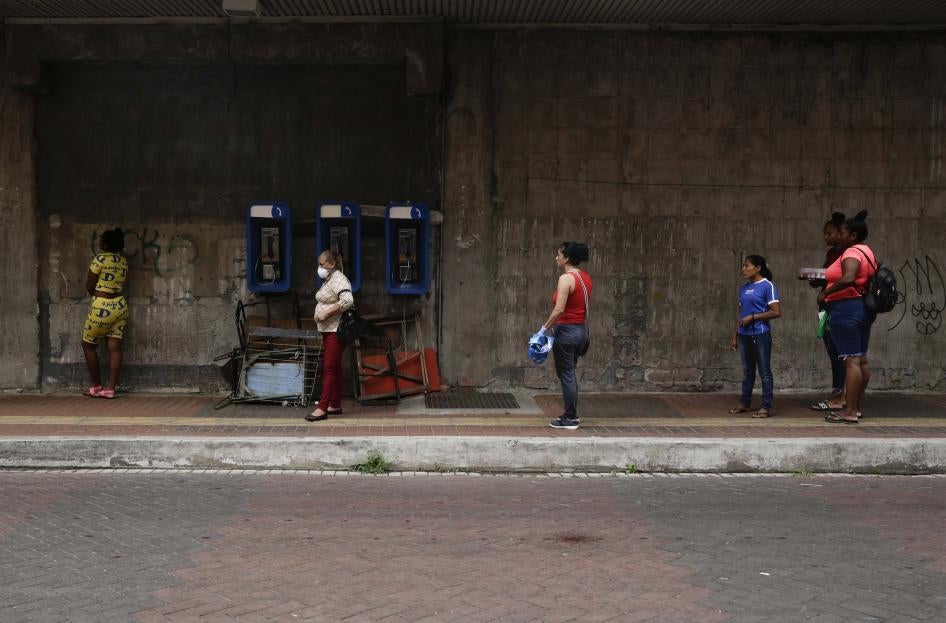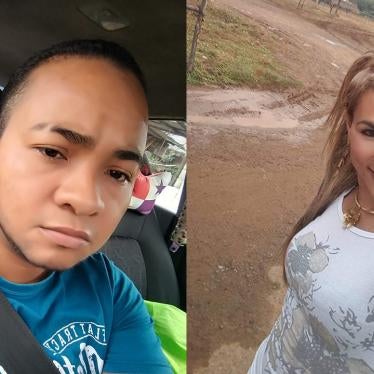Update: On July 16, 2020, the government of Panama published a statement that specifically acknowledged for the first time the reports of discrimination against transgender people. The statement, issued by five government ministries and the Ombuds’ Office, denounced transphobia and affirmed that Panama respects “the diversity of identity and expression.” It called upon public and private entities to abstain from discrimination and raised potential sanctions for those individuals who are found to have discriminated. The statement came after Human Rights Watch issued a press release on new cases of discrimination on July 13, 2020, and after a series of meetings with government ministries and agencies in the preceding weeks.
Panama’s Ministry of Public Security announced last month that it had ordered security forces to avoid discriminating against lesbian, gay, bisexual, transgender, and intersex (LGBTI) people under its Covid-19 policies – an important acknowledgment of the rights of transgender people in the country and the abuse they have faced during the pandemic.
From April 1 through June 1, 2020, Panamanian authorities had in place a gender-based quarantine schedule that specified alternating days for men and women to leave their homes. The schedule did not recognize the situation of transgender people whose gender identity or expression may not match the sex marker on their ID.
Police and private security guards singled out transgender people under this system and, in some cases, arrested, fined, or harassed them. This occurred irrespective of whether the days they chose to go out matched the sex marker on their ID or their gender identity or expression.
Human Rights Watch, with support from trans activist groups in Panama, including Trans Men Panama and the Panamanian Association of Trans People, identified and interviewed nine transgender people who experienced discrimination, including one woman who said police officers detained her while she was going to the supermarket on a men’s day and inappropriately touched her breasts and mocked her during a body search.
On April 23, Human Rights Watch wrote a letter to Panama President Laurentino Cortizo Cohen, urging him to address and prevent discrimination against transgender people under the quarantine rules. The letter called for clear policies authorizing Panamanians to go out on days that matched their gender identity or expression, direction for law enforcement agents to respect gender identity and expression, and implementation of a complaints procedure.
The letter received widespread attention from national and international media. Human Rights Watch shared the findings with United States government officials, who committed to raising the issue with Panama’s minister of public security. On May 11, the Ministry issued a statement, saying that it gave instructions to security agencies to avoid discrimination against LGBTI people when enforcing the Covid-19-related restrictions.
Despite this positive step, Human Rights Watch received some credible reports of discrimination against transgender people in the period after the statement was issued, in part due to a lack of clarity as to whether trans people could follow quarantine regulations based on their gender identity. We will continue to monitor cases of discrimination against transgender people in Panama.
Starting June 1, as part of a relaxation of Covid-19-related restrictive measures, Panama replaced its gender-based quarantine schedule with a curfew. Under the new measures, anyone can leave their home during permitted times, so long as they use a protective mask and maintain a distance of two meters from other persons. But on June 8, Panama reinstated the gendered quarantine in the provinces of Panama and West Panama citing a rising number of Covid-19 cases, leaving in place the curfew in the rest of the country.
The abuses during the quarantine demonstrate the importance of passing a gender identity law that allows trans people to change their names and gender markers on official documents through a simple administrative procedure. Panama should also adopt legislation that prohibits discrimination on the basis of gender identity and expression and sexual orientation, allowing trans people to live their lives without fear of discrimination for being who they are. In the short term, Panama should ensure that the minister of public security’s instructions are fully implemented so transgender people are not subject to discrimination due to quarantine measures, and that those responsible for abuses are held accountable.









